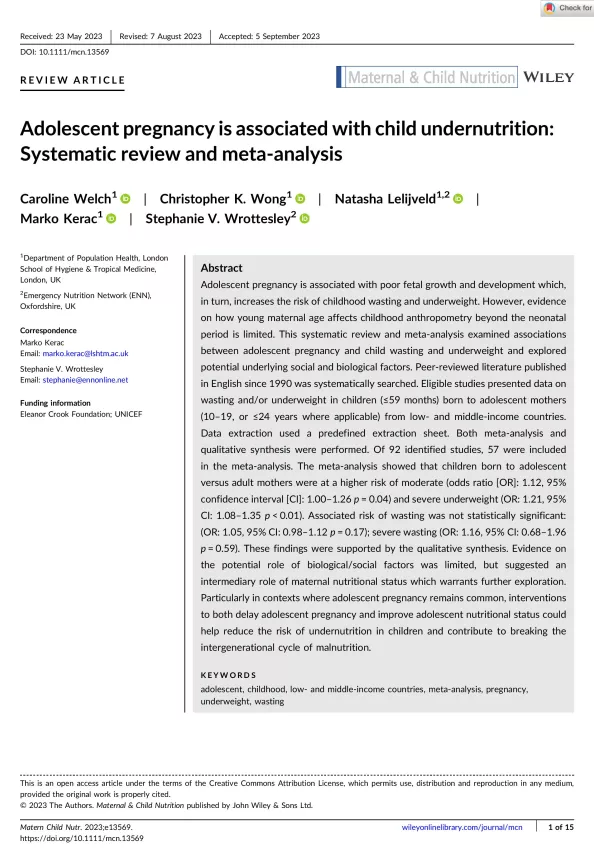Adolescent pregnancy is associated with child undernutrition: Systematic review and meta-analysis
Publication details
Abstract
Adolescent pregnancy is associated with poor fetal growth and development which, in turn, increases the risk of childhood wasting and underweight. However, evidence on how young maternal age affects childhood anthropometry beyond the neonatal period is limited. This systematic review and meta-analysis examined associations between adolescent pregnancy and child wasting and underweight and explored potential underlying social and biological factors. Peer-reviewed literature published in English since 1990 was systematically searched. Eligible studies presented data on wasting and/or underweight in children (≤59 months) born to adolescent mothers (10–19, or ≤24 years where applicable) from low- and middle-income countries. Data extraction used a predefined extraction sheet. Both meta-analysis and qualitative synthesis were performed. Of 92 identified studies, 57 were included in the meta-analysis. The meta-analysis showed that children born to adolescent versus adult mothers were at a higher risk of moderate (odds ratio [OR]: 1.12, 95% confidence interval [CI]: 1.00–1.26 p = 0.04) and severe underweight (OR: 1.21, 95% CI: 1.08–1.35 p < 0.01). Associated risk of wasting was not statistically significant: (OR: 1.05, 95% CI: 0.98–1.12 p = 0.17); severe wasting (OR: 1.16, 95% CI: 0.68–1.96 p = 0.59). These findings were supported by the qualitative synthesis. Evidence on the potential role of biological/social factors was limited, but suggested an intermediary role of maternal nutritional status which warrants further exploration. Particularly in contexts where adolescent pregnancy remains common, interventions to both delay adolescent pregnancy and improve adolescent nutritional status could help reduce the risk of undernutrition in children and contribute to breaking the intergenerational cycle of malnutrition.
Key messages
- Adolescent pregnancy is a potential risk factor for poor child growth and development in low- and middle-income countries.
- This systematic review and meta-analysis showed that being born to an adolescent mother increases a child's risk of moderate and severe underweight up to 5 years of age; data on wasting was more heterogenous.
- Evidence on underlying biological/social factors was limited but suggested a possible intermediary role of maternal nutritional status.
- Where adolescent pregnancy is common, interventions to delay adolescent pregnancy and improve adolescent nutritional status could help reduce the risk of undernutrition in children, helping break the intergenerational cycle of malnutrition.

Cite this publication
Reference this page
Welch, C., Wong, C. K., Lelijveld, N., Kerac, M., & Wrottesley, S. V. (2024). Adolescent pregnancy is associated with child undernutrition: Systematic review and meta-analysis. Maternal & Child Nutrition, 20, e13569. https://doi.org/10.1111/mcn.13569